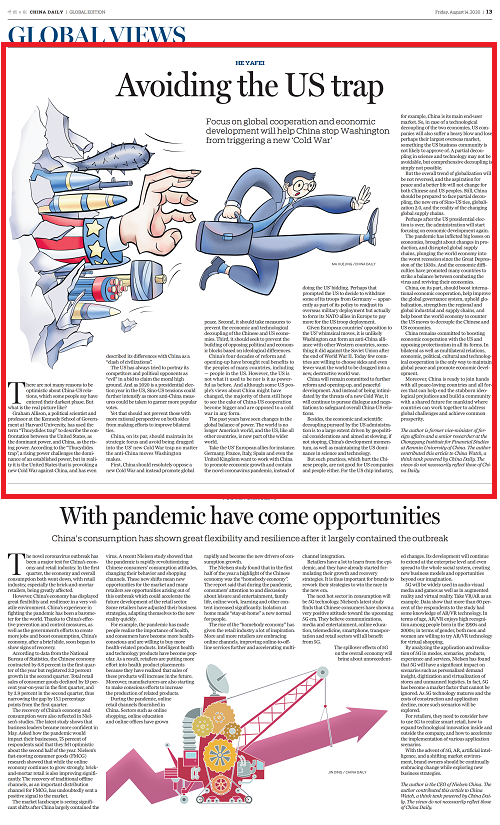Major Power Relations
Your Present Location: PROGRAMS> Major Power RelationsHe Yafei: Avoiding the US trap
By He Yafei Source: China Daily Published: 2020-08-14
There are not many reasons to be optimistic about China-US relations, which some people say have entered their darkest phase. But what is the real picture like?
Graham Allison, a political scientist and professor at the Kennedy School of Government at Harvard University, has used the term "Thucydides trap" to describe the confrontation between the United States, as the dominant power, and China, as the rising power. According to the "Thucydides trap", a rising power challenges the dominance of an established power, but in reality it is the United States that is provoking a new Cold War against China, and has even described its differences with China as a "clash of civilizations".

MA XUEJING/CHINA DAILY
The US has always tried to portray its competitors and political opponents as "evil" in a bid to claim the moral high ground. And as 2020 is a presidential election year in the US, Sino-US tensions could further intensify as more anti-China measures could be taken to garner more popular votes.
Yet that should not prevent those with more rational perspective on both sides from making efforts to improve bilateral ties.
China, on its par, should maintain its strategic focus and avoid being dragged into the US' new Cold War trap no matter the anti-China moves Washington makes.
First, China should resolutely oppose a new Cold War and instead promote global peace. Second, it should take measures to prevent the economic and technological decoupling of the Chinese and US economies. Third, it should seek to prevent the building of opposing political and economic blocks based on ideological differences.
China's four decades of reform and opening-up have brought real benefits to the peoples of many countries, including-people in the US. However, the US is not what it used to be nor is it as powerful as before. And although some US people's views about China might have changed, the majority of them still hope to see the cake of China-US cooperation become bigger and are opposed to a cold war in any form.
The past years have seen changes in the global balance of power. The world is no longer America's world, and the US, like all other countries, is now part of the wider world.
Take the US' European allies for instance. Germany, France, Italy, Spain and even the United Kingdom want to work with China to promote economic growth and contain the novel coronavirus pandemic, instead of doing the US' bidding. Perhaps that prompted the US to decide to withdraw some of its troops from Germany-apparently as part of its policy to readjust its overseas military deployment but actually to force its NATO allies in Europe to pay more for the US troop deployment.
Given European countries' opposition to the US' whimsical moves, it is unlikely Washington can form an anti-China alliance with other Western countries, something it did against the Soviet Union after the end of World War II. Today few countries are willing to choose sides and even fewer want the world to be dragged into a new, destructive world war.
China will remain committed to further reform and opening-up, and peaceful development. And instead of being intimidated by the threats of a new Cold War, it will continue to pursue dialogue and negotiations to safeguard overall China-US relations.
Besides, the economic and scientific decoupling pursued by the US administration is to a large extent driven by geopolitical considerations and aimed at slowing, if not stopping, China's development momentum, as well as maintaining the US dominance in science and technology.
But such practices, which hurt the Chinese people, are not good for US companies and people either. For the US chip industry, for example, China is its main end-user market. So, in case of a technological decoupling of the two economies, US companies will also suffer a heavy blow and lose perhaps their largest overseas market, something the US business community is not likely to approve of. A partial decoupling in science and technology may not be avoidable, but comprehensive decoupling is simply not possible.
But the overall trend of globalization will be not reversed, and the aspiration for peace and a better life will not change for both Chinese and US peoples. Still, China should be prepared to face partial decoupling, the new era of Sino-US ties, globalization 2.0, and the reality of the changing global supply chains.
Perhaps after the US presidential election is over, the administration will start focusing on economic development again.

The pandemic has inflicted big losses on economies, brought about changes in production, and disrupted global supply chains, plunging the world economy into the worst recession since the Great Depression of the 1930s. And the economic difficulties have promoted many countries to strike a balance between combating the virus and reviving their economies.
China, on its part, should boost international economic cooperation, help improve the global governance system, uphold globalization, strengthen the regional and global industrial and supply chains, and help boost the world economy to counter the US moves to decouple the Chinese and US economies.
China remains committed to boosting economic cooperation with the US and opposing protectionism in all its forms. In bilateral as well as multilateral relations, economic, political, cultural and technological cooperation is the only way to maintain global peace and promote economic development.
Moreover, China is ready to join hands with all peace-loving countries and all forces that can help end the stubborn ideological prejudices and build a community with a shared future for mankind where countries can work together to address global challenges and achieve common prosperity.
The author is a senior fellow of Chongyang Institute for Financial Studies at Renmin University of China.























































































 京公网安备 11010802037854号
京公网安备 11010802037854号





